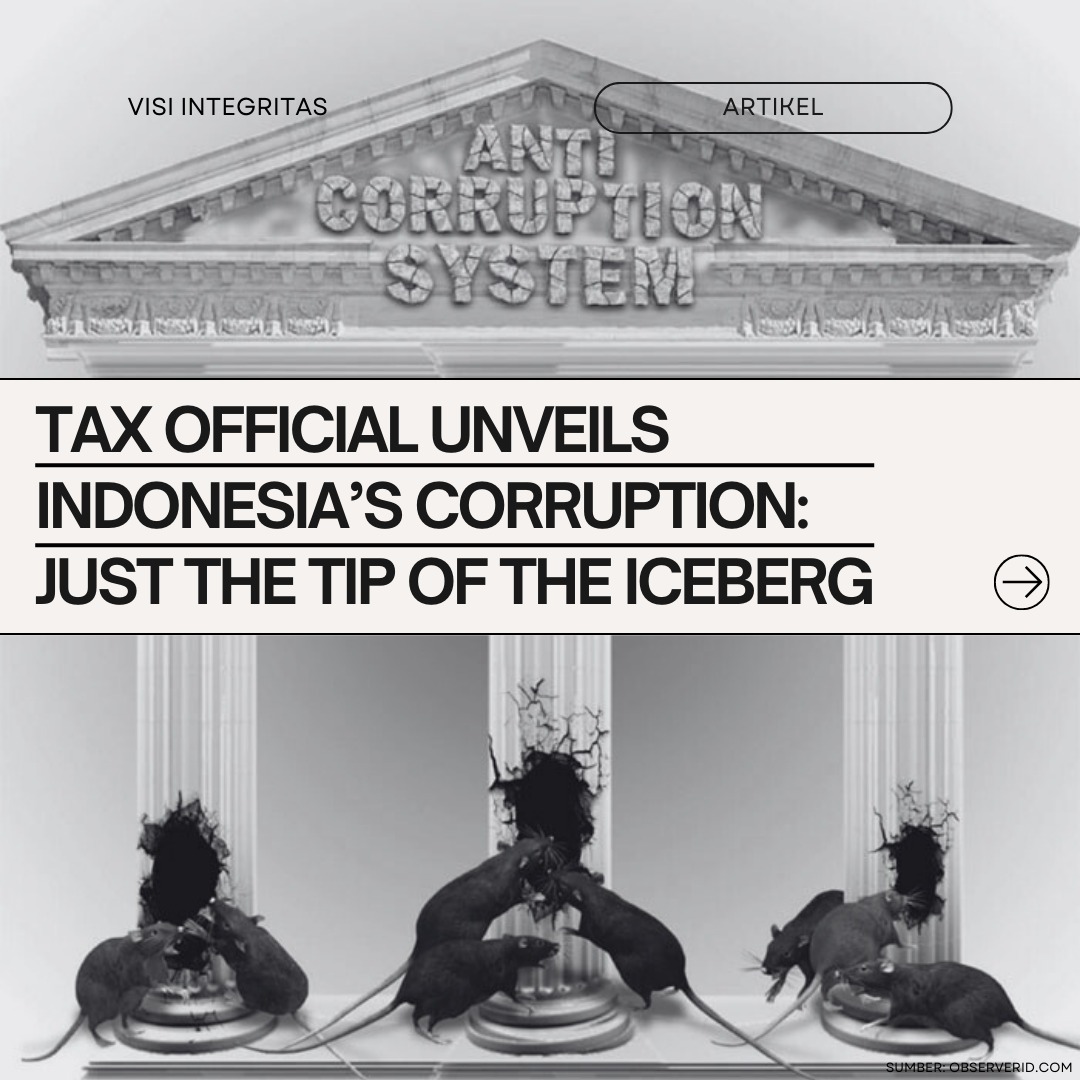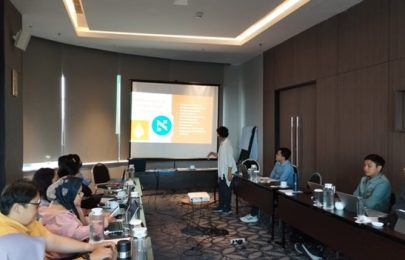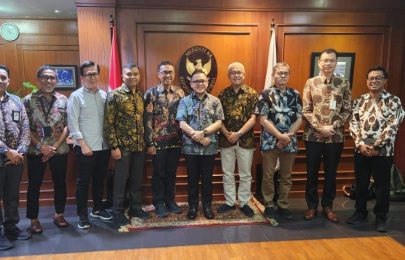Tax Official Unveils Indonesia’s Corupption: Just The Tip Of The Iceberg
Tax Official Unveils Indonesia’s Corupption: Just The Tip Of The Iceberg

He (ex-tax official Rafael Alun Trisambodo) took too much ill-gotten money. If he took just small amounts, it’s okay. Because he got too greedy, God was angry (with him)” (Melchias Markus Mekeng, House Committee XI member from the Golkar faction).
Inflection point. That is perhaps the apt phrase to describe the current state of the ongoing corruption eradication drive in Indonesia. Not only because the government’s anticorruption performance is increasingly sluggish, but because the boundaries between public and private affairs are becoming blurrier. In the fields of administration, politics and law, the government is under greater pressure, especially after Reformasi, where an array of conflicts of interest in decision-making take place in plain view. Holding concurrent positions, public officials running private businesses, bribing judges to resolve court cases, to high-ranking police officer selling seized drugs to dealers are just some examples. This phenomenon signals that the democratic accountability of power is being severely disrupted.
Even though the government, through a deluge of public statements emphasizing its serious commitment to corruption eradication, the public remains skeptical. According to anti-graft NGO Transparency International (TI), Indonesia’s Corruption Perception Index (CPI) score in 2022 dropped sharply, from 38 to 34 – on a scale of 0 (highly corrupt) to 100 (very clean). The country ranked 110th out of 180 countries surveyed, on par with countries such as Bosnia-Herzegovina, Gambia, Malawi, Nepal and Sierra Leone. In Southeast Asia, Indonesia is far behind Singapore (83), Malaysia (47) and Vietnam (42). This means that in the 2021-22 period, the global community held an increasingly negative perception/ sentiment towards Indonesia’s corruption eradication program. TI even explicitly states that the decline in Indonesia’s GPA score in 2022 is the worst in 2 decades. (FIGURE-1)
If we refer to the chart above, Indonesia’s anticorruption performance has been fluctuating over a six-year period, from a high of 20 in 2004. As the anti-corruption approach shifted along with a change in government/ regime, Indonesia has remained stuck in a “red zone.” The result in 2022 showed that during 19 years of efforts to eradicate corruption, Indonesia has failed to move the needle past the score of 1 each year, on average.
Corruption: Disease or symptom?
Along with a perception of deteriorating performance in corruption eradication, the phenomenon of corruption at various levels of government, including at the heart of state treasury – the Finance Ministry (Kemenkeu) – has been laid bare. Rafael Alun Trisambodo, a middle-ranking official at the Taxation Directorate General (DJP) under Kemenkeu, has been named a suspect in an alleged gratification case by the Corruption Eradication Commission (KPK). He is also being investigated for criminal money-laundering. KPK suspects that he has abused his position and accumulated his ill-gotten assets over 12 years.
In his Public Official Asset Declaration (LHKPN), Trisambodo reported his wealth at Rp56 billion. However, following a further investigation, the Financial Transaction Reports and Analysis Center (PPATK) found an unreported deposit of Rp37 billion in foreign currency. The financial intelligence agency also reported transactions worth Rp500 billion in 40 accounts allegedly owned by Trisambodo and his family members and the tax consulting firms they set up.
Based on PPATK findings in the 2009-22 period, Coordinating Political, Legal and Security Affairs Minister Mahfud MD dropped another bombshell, that there was Rp349 trillion worth of transactions suspected to be money-laundering acts by Kemenkeu staff. This has brought a spotlight onto suspicious jaw-dropping transactions involving the DJP, Customs & Excise Directorate General (DJBC) and hundreds of State Civil Apparatus (ASN), as well as private sector entities and individuals.
Not long afterwards, KPK launched an investigation into alleged deduction/manipulation of performance allowances at the Energy and Mineral Resources (ESDM) Ministry which took place between 2020-22 involving 10 employee in the ministry’s finance department, with state losses estimated to be between Rp20 trillion to Rp30 billion.
n its 2022 study, anti-graft watchdog Indonesian Corruption Watch (ICW) uncovered 579 corruption cases in Indonesia, involving 1,396 suspects, as well as state losses reaching tens of trillions of Rupiah from bribery, kickbacks, markups, embezzlement, illegal levies, fictitious projects, money laundering and whatnot. (FIGURE-2) (FIGURE-3)
It is an undeniable fact that the public sector is rife with corruption. The modus operandi varies, ranging from the classic/conventional, as in the allowance deductions at the ESDM Ministry to more sophisticated ones, using gatekeepers, shell companies, multiple bank accounts and multi-layered financial transactions with the purpose of obscuring the origin of the assets owned, as evidenced by the Trisambodo affair.
In fact, corruption can be viewed from two perspectives, namely, corruption as a disease and symptom. The former regards abuse of power as the cause of various problems faced by society. Dealing with this type of corruption calls for stricter law enforcement. Here, corruption can be analogized as fire while law enforcement the freighter.
The latter views corruption as a symptom of a more serious problem, especially in the public sector. Here, corruption is seen as the result of a flawed system of governance by the government and state apparatus which opens up opportunities for malfeasance. The ESDM Ministry case should not have occurred in a modern bureaucracy, because the detection and monitoring system within the Ministry is considered adequate. However, the facts suggest otherwise: the system that was put in place and supposedly capable of detecting various irregularities was not strengthened. As a result, corruption becomes a latent scourge.
In the broader context of governance, corruption becomes prevalent due to the weakness and ineffectiveness of the accountability system – both horizontally and vertically. Horizontal accountability requires a system of checks and balances, oversight, audit, monitoring, review, evaluation, investigation, etc. by agencies given the mandate to carry out such functions. Horizontal accountability includes external, independent state organs, such as KPK, Constitutional Court (MK), Supreme Audit Agency (BPK) and Judicial Commission (KY).
Meanwhile, vertical accountability requires a strong oversight from the public/civil society, which encompass community groups, non-governmental organizations (NGOs), professional associations, labor unions, as well as the academia and the press (including citizen journalists empowered by social media). In short, it is equally important to maintain and strengthen the two accountability mechanisms, to ensure that corruption eradication efforts can be optimized, not weakened.
Weakened horizontal accountability
One of the root causes of Indonesia’s declining anticorruption performance was the government’s political decision to revise KPK Law in 2019. Even though it was very unpopular, marked by legal challenge and public demonstrations, the government was steadfast and pushed the agenda forward. The implication is clear: the public’s trust of the KPK started to diminish after the revision. The KPK is also rapidly losing its respect and credibility in eradicating corruption, because the corruption cases it handled were no longer of the “big fish” category. KPK fell into a crisis of integrity and legitimacy, especially its leaders, who were deemed problematic and suspected of being involved in corruption and serious ethical violations themselves. The poor selection of incumbent KPK commissioners by the government and the House raised serious concerns in many quarters whether the graft busting agency is beholden to certain political interests. The KPK’s handling of Formula E corruption allegation in Jakarta, which many suspected was forced to incriminate then Jakarta Governor Anies Baswedan (as stated by ex-KPK deputy chairman Bambang Widjojanto himself) further damaged KPK’s reputation.
Besides KPK, other quasi-state institutions have also been not spared from the “domestication” agenda. MK, for example. Apart from ethical issue (MK Chief Justice Anwar Usman is President Jokowi’s brother-in-law), MK is also being scrutinized by the public due to its raft of controversial rulings which tend to be in favor of the government, for example in the judicial review against KPK Law and Job Creation Law. In addition, KY, Prosecutors Commission (Komjak), National Police Commission (Kompolnas), Central Information Commission (KIP), Ombudsman and so on cannot play an effective role due to their limited powers and their being mired in a number of serious ethical issues, including the holding of concurrent positions by members of those commissions in state-owned enterprises (SOEs).
Meanwhile, the early detection function within government organizations is barely functioning. Even though the government has repeatedly emphasized the importance of strengthening internal control, the matter has received minimal attention. Finance Minister Sri Mulyani even acknowledged that a third of Kemenkeu’s Internal Supervisory Unit members only hold Diploma I degree. They did not even attain Diploma III, let alone Diploma IV (Bachelor’s Degree) whereas they are tasked with overseeing tens of thousands of Kemenkeu staff in various positions, including top officials, who are prone to corruption due to their authority as tax collectors or investigators. And this despite Kemenkeu’s internal supervisors being touted as one of the best vis-à-vis other ministries/ agencies.
Dying vertical accountability
The cases in Indonesia confirm that corruption has a correlation with weak democracy, because good governance requires a strong and active civil society. By contrast, corruption will become prevalent if there is lack of control from civil society. Various maneuvers by the political elites to weaken the power of civil society, including the press, have become more intense especially in the past five years. Criminalization, cyberattacks, hacking, countersuits using the “rubber clauses” of the Electronic Information and Transactions (ITE) Law, restrictions on access to information, intimidation, and even murder have haunted various civil society groups in Indonesia. Likewise, intimidation against journalists and the lack of protection for those who report on corruption cases have discouraged public participation.
At the same time, the government and the House often crafted various pieces of legislation that do not adhere to the precept and principle that guarantee public participation in the decision-making process. Various national regulations were rushed through, under the pretext that they are crucial to enhance ease of doing business and attract much-needed investments to boost national economic development. Economic interests are seen as paramount within the framework of national policies, while values, norms and accountability within the framework of a democracy are seen as something that interferes with economic performance.
It is thus no wonder that a raft of hastily passed regulations have opened the door for political corruption dubbed “state capture.” Most stemmed from relaxation of regulations, due diligence checks, procedures and mechanisms that serve as guardrails for good governance. Without clear rules, there is no firewall to prevent corruption by political and business elites. This will create situations ripe for business-government collusion using their authority to formulate policies that ultimately will undermine Indonesia’s anticorruption system, one which has been painstakingly built since the dawn of Reformasi. If public officials, ASN, and the private sector start to trivialize corruption again, as we have frequently seen today, Indonesia’s anticorruption drive will be bogged down, running in circles.
Adnan Topan Husodo, Wakil Direktur Visi Integritas
*Artikel ini sudah terlebih dulu dipublikasi di Independent Observer pada 8 April, 2023.
Related Articles
Kategori
Artikel Terbaru







